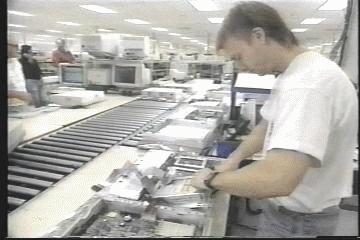"Engineering for Commitment": |
(Links to specific 5-12 minute Segments) |
|
(For more information, go to:-
"Engineering For Commitment" Resource Guide ) |
This 48-minute video tells two stories: the power of 'Socio-Technical Systems' (STS) thinking as a force for improving business results in human and economic terms; and, the career of UCLA Anderson School management professor Louis Davis, an engineer, behavioral scientist and pioneer in the development and application of this radically successful approach to the design of work and organizations. Uniquely offering both an engineering and behavioral science perspective, the video documents Lou Davis' profound contribution to STS and the subsequent evolution of high performance work organizations in North America, Western Europe and Australia over the past forty years. Socio-technical systems design's proven bundle of concepts, values, methodologies and best practices in manufacturing and service industries is now poised for a resurgence in the modern information age. The video features interviews with senior managers, engineers, human resource professionals, union leaders, and academic colleagues of Lou Davis from around North America and the world. Organized in 10-15 minute segments that can be viewed separately, the video is designed for multi-purpose use as a teaching or discussion aid. Documentary footage and photos combine to illustrate innovative work design at three North American work sites: 1) Shell Chemical in Sarnia, Ontario, Canada; 2) the Skippy Peanut Butter plant in Little Rock, Arkansas (now Unilever); and, 3) Mead Paper in Stevenson, Alabama (now Stone-Smurfit). These manufacturing plants, designed on socio-technical principles, are now 25 years old, and remain extremely successful. Highlights are also included from work sites in Nabisco (now Kraft), Salomon Brothers and Hewlett-Packard. 
Narration is provided by Joel Fadem, a former UCLA colleague of Lou Davis and co-founder of its Center for Quality of Working Life.
"Engineering for Commitment" was directed by Bert Painter, a consulting social scientist and film-maker with Modern Times Productions. |

